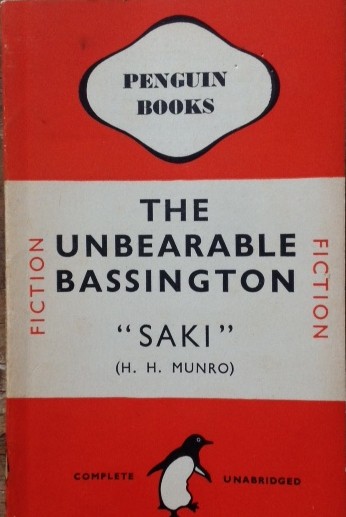Inspiring Older Readers
 posted on 27 Sep 2021
posted on 27 Sep 2021
The Unbearable Bassington by Saki (H.H. Munro)
Born in 1870, Hector Hugh Munro – who published under the pen name of ‘Saki’ – was killed in action during the First World War and a good deal of his writing only came to light posthumously. He is probably best known as a short story writer and appears regularly in anthologies (one of his most famous, Tobermorey, is reviewed here on The Letterpress site) but which were originally published in weekly or monthly papers that offered the most common outlet for these kinds of stories.
The stories of Saki are largely humorous, even satirical, and usually there is a dark underbelly that gives the tale a sting. These same characteristics are also evident in his slim novel, The Unbearable Bassington, which dates from 1912 and which displays a certain kind of Edwardian sensibility. If you can imagine a more prosaic but equally wicked turn of phrase you’d encounter in some of Oscar Wilde’s bon mots, add the socially sceptical eye of Bernard Shaw, the humorous instincts of Jerome K. Jerome and the social sniping of E.F. Benson, you’d begin to get a flavour of what’s between the covers here.
Francesca Bassington is an upper-middle class matriarch, now widowed, cash-strapped for her station in life, and mother of the astonishingly selfish and odious Comus. Francesca’s whole life has become dedicated to getting her son an advantageous marriage. Her social circle is a constant ritual dance that revolves around the fate of eligible young men and women as they hunt out the man most likely to represent public success and girls who bring with them an acceptable fortune.
Francesca’s task of getting Comus fixed up with a spouse who has a sufficient fortune is driven in some measure by her own selfishness – she lives in rented property and she may well find herself cast out unless someone with money and with a family connection buys the house and allows her to stay in the comfort to which she has become accustomed. But Comus seems to be a completely hopeless case, making enemies hand over fist and alienating prospective young women by his willingness to sponge off them. We are told:
“As far as remunerative achievement was concerned, Comus copied the insouciance of the field lily with a dangerous fidelity.”
Comus spends his life thinking that his good looks, wicked charm and sense of entitlement will provide sufficient excuse for his complete lack of any social usefulness.
Much of the story revolves around the wooing of Elaine de Fray by both Comus and his rival in the marriage stakes – up and coming politician Courtenay Youghal. Francesca starts off feeling supremely confident that she has manoeuvred Comus and Elaine together only to discover to her incandescent fury that Youghal emerges victorious because of Comus’ negligent selfishness. She discovers that her boy has committed the most unforgivable of middle class sins against respectability – he has borrowed money from Elaine – and this is the last straw.
Francesca and her meek, rather dull but eminently respectable brother decide the time has come to take action and what they force on Comus turns out to be something of a final solution – but I’m not going to reveal the contents of the final chapter because you’ll want to read that for yourself.
At the end of the book you’ll be forced to consider just who is the ‘unbearable Bassington’ of the title – Comus or Francesca? Are we being asked to condemn the child, Comus, who has grown up with social entitlement as a default setting he can’t let go of and a rebel streak that offends ‘decent’ sensibilities; or, are we being asked to scrutinise the ruthless insistence of his mother, Francesca who is prepared to put social position and her own status ahead of what should be appropriate maternal feelings?
This isn’t a great book or lost masterpiece but it is a book that is very much of its time but which still reads in a way that we can enjoy today – it’s an afternoon or two of spiteful fun and as Saki himself says at the outset:
‘This story has no moral. If it points out an evil at any rate it suggests no remedy.’
I read the old Penguin copy shown in the illustration but modern paperbacks are available online for under a fiver.
Terry Potter
September 2021